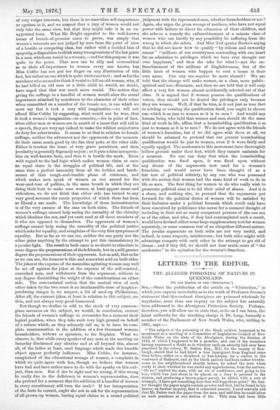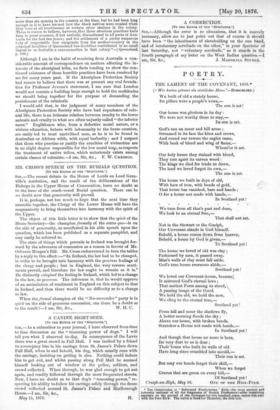LETTERS TO THE EDITOR.
THE ALLEGED POISONING- OF NATIVES IN QUEENSLAND.
[To THE EDITOR OF THE "SPECTATOR.")
Sin,—Since the publication of the article on "Vivisection," in which you express incredulity as to the truth of Professor Jevons's statement that Queensland aborigines are poisoned wholesale by strychnine, more than one inquiry on the subject has naturally been addressed to the Aborigines Protection Society. Perhaps, therefore, you will allow me to state that, so far as I can learn, the latest authority for the revolting charge is Dr. Lang, formerly a member of the Parliament of New South Wales, who, writing in 1861, says :—
4, The subject of the poisoning of the black natives happened to be mentioned at a meeting of a Committee of Legislative Council of New South Wales on the state of the Aborigines, during the Session of 1845, of which I happened to be a member, and one of the members having expressed a doubt as to whether such an atrocity had ever been practised in the colony, W. Suitor, Esq., M.O. for the county of Rox- burgh, stated that he had hired a free immigrant from England some time before, either as a shepherd or but-keeper, for a station to the westward of Bathurst, and as the black natives had been rather trouble- some in the neighbourhood shortly before, he asked the man when ready to start whether he was under any apprehension, from the natives. 'Oh no !' replied the man, with an air of confidence, and going to his box, which was just about to be placed on a dray to proceed to the station, and producing a brown-paper parcel, he added, with a sort of triumph, have got something here that will keep them quiet Mr. Sut- ter thought the paper might contain powder anctabot, but he found to his horror, on further inquiry, that it contained arsenic. I need scarcely add that dr. Sutter took the paper from the man, and told him he could allow no such practices at any station of his. This man had been little more than six months in the country at the time, but he had been long enough in it to have learned how the black natives were treated when they wore at all troublesome at certain other stations in the colony. There is reason to believe, however, that these atrocious practices have been in great measure, if not entirely, discontinued in all parts of Aus- tralia for the last ten years ; and the settlement of a pretty numerous body of respectable free emigrants from the mother-country in the principal localities of Queensland has doubtless contributed in no small degree to so desirable a consummation in that colony."—(Queensland, p. 169.)
Although I am in the habit of receiving from Australia a con- siderable amount of correspondence on matters affecting the in- terests of the aboriginal tribe, no facts tending to show the con- tinued existence of these horrible practices have been received by me for many years past. If the Aborigines Protection Society had reason to believe that there was at present any real founda- tion for Professor Jevons's statement, I am sure that London would not contain a building large enough to hold the multitudes we should bring together for the purpose of demanding the punishment of the criminals.
I would add that, in the judgment of many members of the
Aborigines Protection Society who have had experience of colo- ffial life, there is an intimate relation between cruelty to the lower animals and cruelty to what are often unjustly called "the inferior races." Englishmen who, from a defective moral nature, or a vicious education, behave with inhumanity to the brute creation, are easily led to treat uncivilised man, as he is to be found in Australian or African wilds, with equal barbarity; and I suspect
that those who practise or justify the cruelties of vivisection are in no slight degree responsible for the low moral tow, as respects
the treatment of native tribes, which notoriously exists among certain classes of colonists.—I am, Sir, &c., F. W. CHESSON.































 Previous page
Previous page